Phoenix R250 is a powerful dehumidifier designed for indoor use. With its epoxy-coated coils, it offers extended lifespan, protection against corrosion, and maintained heat transfer ability. It efficiently removes moisture from the air, extracting up to 135 pints per day, while consuming only 8.3 amps of electricity. The unit features a heavy-duty retractable handle for easy transport and storage. It operates effectively in a wide temperature range, up to 110°F, and includes a built-in condensate pump for convenient water removal.
Phoenix R250 is a powerful dehumidifier designed for indoor use. With its epoxy-coated coils, it offers extended lifespan, protection against corrosion, and maintained heat transfer ability. It efficiently removes moisture from the air, extracting up to 135 pints per day, while consuming only 8.3 amps of electricity. The unit features a heavy-duty retractable handle for easy transport and storage. It operates effectively in a wide temperature range, up to 110°F, and includes a built-in condensate pump for convenient water removal.









-
 1
1
-
 2
2
-
 3
3
-
 4
4
-
 5
5
-
 6
6
-
 7
7
-
 8
8
-
 9
9
Phoenix R250 is a powerful dehumidifier designed for indoor use. With its epoxy-coated coils, it offers extended lifespan, protection against corrosion, and maintained heat transfer ability. It efficiently removes moisture from the air, extracting up to 135 pints per day, while consuming only 8.3 amps of electricity. The unit features a heavy-duty retractable handle for easy transport and storage. It operates effectively in a wide temperature range, up to 110°F, and includes a built-in condensate pump for convenient water removal.
Ask a question and I''ll find the answer in the document
Finding information in a document is now easier with AI
Related papers
-
Phoenix R200 LGR Owner's manual
-
Phoenix R200 LGR Owner's manual
-
Phoenix 250 MAX LGR Dehumidifier Owner's manual
-
Phoenix TS-1141 Owner's manual
-
Phoenix R150 LGR Owner's manual
-
Phoenix DryMAX 4036060 Owner's manual
-
Phoenix 617B Owner's manual
-
Phoenix DryMAX XL Quick start guide
-
Phoenix 200 MAX Owner's manual
-
Phoenix 200 MAX Owner's manual
Other documents
-
Impecca IDM72-SP User guide
-
Vacmaster AM201 0101 User manual
-
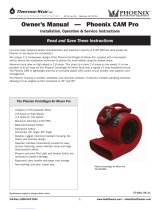 Therma-Stor Phoenix CAM Pro Owner's manual
Therma-Stor Phoenix CAM Pro Owner's manual
-
Fantech EPD180CR Installation and Maintenance Manual
-
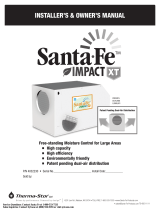 Santa Fe IMPACT XT 4032230 Owner's manual
Santa Fe IMPACT XT 4032230 Owner's manual
-
Aprilaire E130C User manual
-
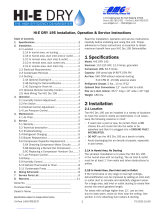 HI-E DRY 195 Installation, Operation & Service Instructions
HI-E DRY 195 Installation, Operation & Service Instructions
-
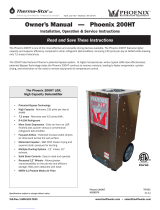 Therma-Stor Phoenix 200HT LGR Owner's manual
Therma-Stor Phoenix 200HT LGR Owner's manual
-
AlorAir Storm Pro User guide
-
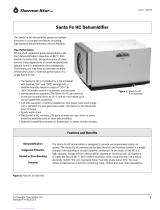 Therma-Stor Products Group 4025273 User manual
Therma-Stor Products Group 4025273 User manual













